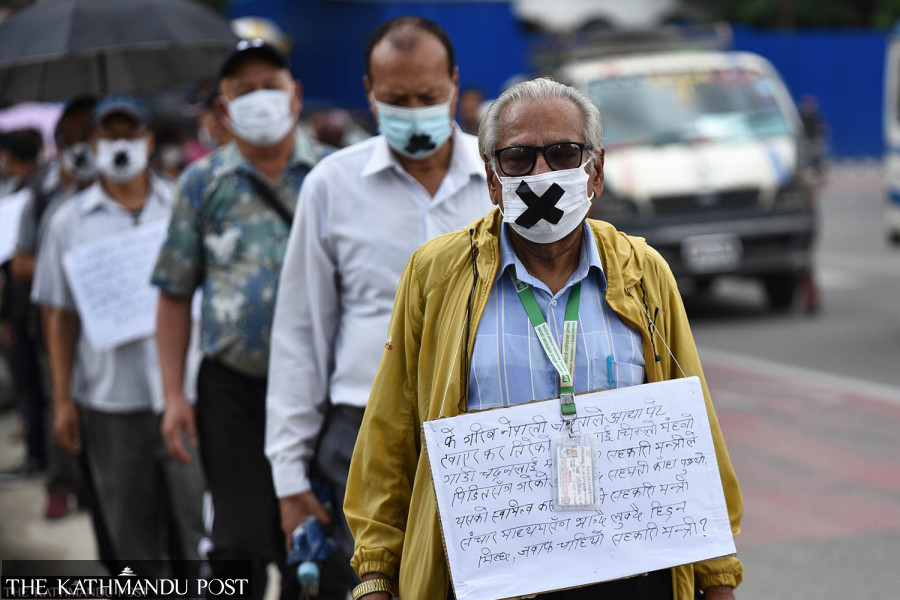National
Government vows to seize passports, auction assets of cooperatives fraud accused
Around 3 million people are estimated to be associated as members in over 34,000 cooperatives across the country.
Post Report
Deputy Prime Minister and Finance Minister Bishnu Prasad Paudel has announced that the passports of individuals involved in misappropriating cooperatives funds will be confiscated.
Presenting the national budget for the fiscal year 2025-26 to a joint session of the federal parliament on Thursday, Paudel announced the government plan to seize the passports of cooperatives operators, officials, and individuals involved in the misuse of depositors’ savings.
He further stated that the assets of those accused would be seized and auctioned off, and the recovered funds would be used to compensate the affected families through the establishment of a revolving fund.
The fiscal budget also proposes the establishment of a Cooperative Loan Recovery Tribunal (CLRT). The government plans to classify, consolidate, and implement structural reforms in the cooperative sector.
The government in January, through an ordinance, formed the National Cooperative Regulatory Authority (NCRA) that replaced the National Cooperative Development Board. The Authority was envisioned as a powerful mechanism to help depositors recover their money, yet it has remained largely dysfunctional due to the government’s failure to appoint its chief even four months after its establishment.
Arjun Pokhrel, who retired last month as secretary at the Ministry of Land Management, Cooperatives, and Poverty Alleviation, was entrusted with the responsibility of its chairperson until a dedicated chair is appointed. Following his retirement on April 15, Kedar Nath Sharma, the ministry’s current secretary, was assigned the role in a stopgap arrangement. The government recently announced a vacancy for the head of the Authority, and also positions for two board members remain unfilled.
Despite the budget’s pledge to form the Tribunal as an additional mechanism to recover cooperatives funds, former chair of Crisis Cooperative Management Committee Kashi Raj Dahal noted that the idea is not new. He pointed out that the concept was already outlined in the Cooperative Act 2017, and the government is now taking steps towards its implementation.
Dahal clarified the distinct roles of the two bodies, “While the Authority is responsible for registering and supervising cooperatives, ensuring their compliance with the law, the Tribunal would function like a judicial body, allowing victims to lodge complaints and seek justice.”
However, he also criticised the finance minister for the lack of specificity in the budget speech. “While the government spoke of confiscating the assets of cooperatives operators, it did not clarify which types of property would be targeted. It would have been more effective had the budget specified whether, in cases where the operator’s property is insufficient, assets belonging to family members could also be seized,” he said.
Dahal noted that while legal provisions for asset confiscation exist, the government missed the opportunity to explain how cooperatives will be integrated into the national economy to enhance productivity.
The budget also addresses deposits protection, proposing that the amount up to Rs500,000 deposited in the cooperatives will be safeguarded through a Deposit and Credit Protection Fund. While last year’s budget made a similar promise, it was not implemented citing the lack of procedures required for that.
Ganesh Prasad Bhatta, spokesperson for the Ministry of Land Management, Cooperatives, and Poverty Alleviation, expressed optimism that this year’s announcement would be fulfilled.
“The previous commitment could not be realised due to a lack of working procedures. But this time, establishing a revolving fund provides a clear mechanism for returning depositors’ money,” he said.
Additionally, the fiscal budget outlines plans to digitise collateral registration and release processes within banks, financial institutions, and cooperatives, aiming to enhance efficiency through an integrated online system.
Around 3 million people are estimated to be associated as members in over 34,000 cooperatives across the country.
Thousands of cooperatives victims from across the country have formed struggle committees and have been holding protests for the past couple of years seeking their money deposited in the cooperatives.
Madhav Shrestha, 44, a vicitimised depositor of the Uttam Cooperative based in Kapan, Kathmandu says that if the provision related to cooperatives introduced in the government’s budget such as the CLRT and the revolving fund are implemented, it would be a positive step.
Shrestha mentions that last year as well, the government had included commendable points in the budget, but they were not implemented.
“Even this time, we are in no position to be excited merely by the budget announcement. What matters is its implementation,” he said.
Many of them have filed complaints in several districts and the authorities have chargesheeted many people including Rastriya Swatantra Party chair and former home minister Rabi Lamichhane with embezzling the cooperative funds.




 11.43°C Kathmandu
11.43°C Kathmandu












